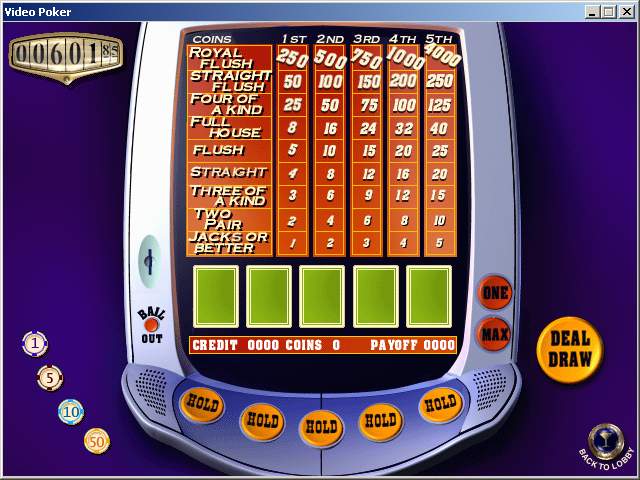2: Table Poker
There are few different variations of a Table Poker, most known are Draw
Poker, 7-Stud, 6-Stud, Caribbean and Deuces Wild.
The objective of poker is to win the pot, which is the money
that accumulates as players who remain in the game keep raising their bets.
Unless a game of high/low poker is being played, the player with the highest
hand at the end of the game wins the pot. There are two ways to win, by
holding the highest hand in the game, or by making your opponents think
you've got the highest hand-in which everyone else folds leaving you to
win the pot.
Poker games start with a shuffle and cut of the deck and then the players
ante before the dealer deals a card. To ante, each player is required to
put a small amount of money, usually a percentage of the minimum bet, into
the pot. Games are played with colored poker chips that correspond to different
denominations of money. The dealer is responsible for dealing each round.
Strict rules govern the betting order, which also varies with the type of
poker game played. The betting order is important because the player who
bets first has the disadvantage of providing other players with information
about their hand before receiving any information about any other player's
hand. The player who bets last has the advantage of seeing how everyone
else bets before deciding whether or not to play their hand. In most games
the dealer deals clockwise, starting with the player to the dealer's left.
There are different numbers of betting rounds in different poker games.
During each round, betting moves clockwise around the table and players
can either check, call, raise, or fold. When you check that means you want
to stay in the game, but don't want to bet. When you check, you forfeit
the right to raise in the current round unless "check and raise" is allowed
in your game. After someone makes the first bet, all other players can only
call, raise or fold. When you call, you match the most recent bet and place
the appropriate stack of chips in front of you for the dealer to place in
the pot. Another option is to raise the amount of the bet by matching the
previous bet and raising the amount by an additional amount. After the bet
has been raised, all other players remaining in the pot must call with the
higher amount of chips, or fold. In many poker games, the bet can be raised
only three times in the same betting round. When you don't think that your
hand is good enough to win and don't feel like bluffing, you can fold or
drop out of the hand. Depending upon the game, there might be several rounds
of betting, with a card or cards dealt between the rounds.
When two or more players remain in the game at the end of the last round
of betting, each of the players show their cards in a showdown. The hand
with the highest poker value wins the pot. The house makes a profit by taking
the rake, a percentage of each pot. The rake percentage varies from two
to 10 percent, but in some cases there is a maximum dollar amount or a flat
fee.
There are two different types of poker games: draw poker and stud poker.
In draw poker you can draw new cards from the deck after the initial cards
are dealt, your cards are usually dealt face down, and you bet after receiving
your initial cards and after you draw new cards. In stud poker games, you
play with your initially dealt cards, some cards are face down and some
are face up, and you bet after each new face up card is dealt and after
the last face down card is dealt.
Both of these types of games can involve either five cards or seven, and
can be played in one of two ways: high or high/low. When a poker game is
played high, the highest hand wins the pot. When a poker game is played
high/low, the pot is split between the person with the highest hand and
the person with the lowest hand.



